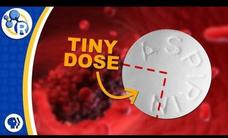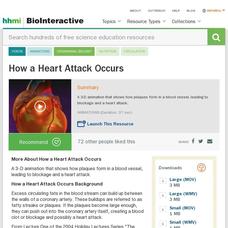TED-Ed
TED-ED: Why do people fear the wrong things? - Gerd Gigerenzer
A new drug reduces the risk of heart attacks by 40%. Shark attacks are up by a factor of two. Drinking a liter of soda per day doubles your chance of developing cancer. These are all examples of a common way risk is presented in news...
TED-Ed
TED-Ed: Jeff Leek and Lucy McGowan: Can you spot the problem with these headlines? (Level 1)
In medicine, there's often a disconnect between news headlines and the scientific research they cover. While headlines are designed to catch attention, many studies produce meaningful results when they focus on a narrow, specific...
SciShow
How Studying Elephant Seals Could Treat Heart Attacks
Generally, when you think of carbon monoxide, nothing good comes to mind. And that’s… pretty reasonable. But elephant seals show us how we might be able to use carbon monoxide as an effective therapy for heart attacks and strokes.
TED Talks
Tim Harford: Trial, error and the God complex
Economics writer Tim Harford studies complex systems -- and finds a surprising link among the successful ones: they were built through trial and error. In this sparkling talk from TEDGlobal 2011, he asks us to embrace our randomness and...
SciShow
Which is Worse For You Sugar or Fat
For decades, we’ve heard how terrible fat is for us, but more recently, sugar has become the new villain. What does the science actually say about these two macronutrients and how they affect our health?
SciShow
Why Can't You Donate Platelets After Taking Aspirin?
Curious why you can't donate platelets after taking aspirin? Wonder no more!
MinuteEarth
Why You’re More Likely To Die In Winter
There’s a huge seasonal difference in death rates that is propelled by a variety of factors including pathogen behavior and anatomical response to temperature changes.
TED Talks
Matt Walker: Sleep is your superpower
Sleep is your life-support system and Mother Nature's best effort yet at immortality, says sleep scientist Matt Walker. In this deep dive into the science of slumber, Walker shares the wonderfully good things that happen when you get...
Curated Video
Why are Winters Worse if the Planet is Getting Warmer?
Over the last decade, the American Northeast has seen more than a 200% increase in the frequency of large, disruptive snowstorms. This trend surprised nearly everybody, including many of the top experts, as they had been expecting a...
Curated Video
New Drug Combination Shows Promise in Saving Lives by Lowering Blood Pressure
The Ascot trial revealed that a new drug combination involving a calcium channel blocker and ACE inhibitor, perindopril, has the potential to save thousands of lives by effectively lowering blood pressure and reducing the risk of...
Visual Learning Systems
Healthy Circulatory and Respiratory Systems: Problems of the Circulatory System
This video program explores the role of the body's circulatory and respiratory systems, emphasizing things we can do to maintain these important systems. Regular exercise, healthy eating habits, and not smoking are just a few of the...
Institute of Art and Ideas
Are Hospitals Bad for Us? (long form version)
We ring fence NHS spending and western countries spend ever more on medicine. But a third of all deaths are due to medical intervention and some argue poverty not pathogens makes the biggest difference. Is it a fantasy to believe that...
Wonderscape
Science Kids: Snakes
Learn all about snakes. They slide, they slither, and some of them can even "fly." Understand snake biology, life cycle, fun facts, the various varieties of snakes and how snake venom can actually save lives!
Catalyst University
The EVIDENCE for Sugar-Related Health Defects | Is Fat that Bad?
This video uses systematic reviews and meta-analyses to provide an evidence-based approach [1] criticizing the United States’ view of sugar, fat, and cholesterol; and [2] discussing how sugar has always been the culprit in obesity and...
Bill Carmody
Developing Authentic Leadership: A Path to Transforming Organizations
In this video, Bill Carmody interviews Nicole Heimann, the author of a book called "How to Develop the Authentic Leader in You." They discuss the importance of authenticity in leadership, particularly for CEOs. Nicole emphasizes the...
Healthcare Triage
Is Meat Bad For Us or Not?
We've been talking a lot about meat consumption and its effect on our health. New studies indicate that meat may not be as bad for us as we've been told. But this is controversial. So, how do we talk about new findings that contradict...
Science360
Biological Clocks - Science Nation
Everything from the mysterious phenomenon of "early morning" heart attacks in humans -- to how tiny nocturnal mammals evade predators -- to the blooming of plants -- is regulated by an organism's internal "biological clock." With support...
Press Association
NHS staff reflect on the hardest year of their working lives
A selection of interviews with staff at the Royal Papworth hospital in Cambridge, who discuss how their working lives have changed and been difficult, as the anniversary of the first national lockdown, March 23, draws near.
A surgeon at...
Curated Video
Report: More People Die From Heart Attacks During The Holidays
One thing to keep in mind is that signs of a heart attack can look different in men and women.
Curated OER
The Circulatory System
Compare a variety of animals' circulatory systems to the human circulatory system. Paul Andersen uses his SMART Board to show the differences between two, three, and four chamber hearts, focusing on the human heart.
American Chemical Society
How Does Low-Dose Aspirin Work?
Baby aspirin is a life saver for many adults! A video lesson discusses the effect aspirin has on blood even in low doses. Learners discover how aspirin changes blood clots—a key to preventing medical conditions such as heart attacks and...
Howard Hughes Medical Institute
How a Heart Attack Occurs
Heart disease causes more deaths in both men and women in the United States than any other factor, buy many people don't fully understand what causes a heart attack. A brief animation demonstrates the slow buildup of plaque, a blockage...
TED-Ed
What Happens During a Heart Attack?
Though heart attacks are common, they don't have to be inevitable. A short video not only details what happens during a heart attack, but also provides suggestions for how to lessen the risk factors for the world's leading...




